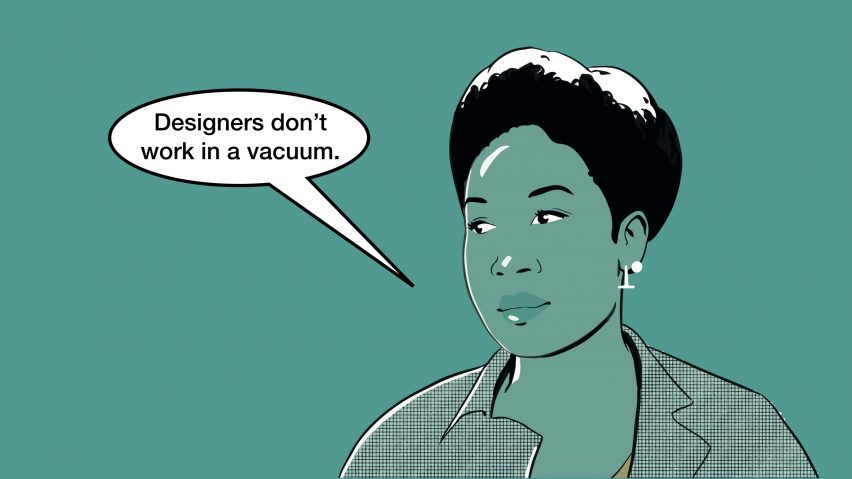Good design is about interrogating systems not just creating beautiful chairs, biofabrication designer Natsai Audrey Chieza argued at Dezeen Day.
Chieza agreed with panel moderator and Dezeen co-founder, Marcus Fairs, that she is less interested in designing iconic products and chooses instead to focus on materials and processes, which is the future of the discipline.
"It's not to say that we can't have designers making chairs," said Chieza. "But I think what designers are starting to do is understand that they don't design in a vacuum."
"There is a system at play and maybe what it means to make good design in the future is to interrogate that system, and to really push it," she told the audience at Dezeen Day.
The challenge is working at scale
Chieza was speaking on a panel about post-plastic materials, alongside architect Arthur Mamou-Mani and designer Nienke Hoogvliet.
The next step for designers working with new materials, she said, is how to implement their ideas at a commercial scale.
"It's very excited that we have new material systems that are coming but I think designers need to work really hard to determine how we actually scale it for impact," she argued. "That's the challenge for anybody working in the space."
"[Otherwise we] find ourselves working with brand new materials that have so much potential, but actually the business model is broken and we're designing for landfill."
These are the questions at the heart of Faber Futures, the biodesign agency founded by Chieza, which explores production methods using living, natural materials.
The agency's most well-known project for example, the Index Award-winning Coelicolor, uses bacteria rather than harmful chemicals to dye fabrics while using up to 500 times less water.
"It's about grassroots individuals"
Neither designers nor industries can afford to wait for governments to take direct legislative or regulatory action on climate change. Instead, Chieza explained, change needs to come from the bottom up.
"We can't wait for politics," she said. "It's not going to happen that way. It's about the grassroots individuals and designers."
"The industry is just suffering from inertia, and waiting for some kind of top-down policy to tell them what to do, and perhaps not really anticipating that they need to be able to start implementing some of these strategies today," Chieza continued.
"If you actually want to be competitive in 10 years, you better start now."
The panel talk was held as part of Dezeen Day at the BFI Southbank on 30 October. The conference featured a series of discussions on the industry's most pressing issues, from the circular economy t0 education.
MoMA's design and architecture curator Paola Antonelli gave a keynote reflecting on her Broken Nature exhibition and said that anger as an important engine for change, while Liam Young argued that architects should be designing video game environments.

